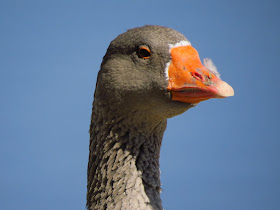Thursday, November 5, 2015
Domestic Greylag Goose
Domestic Greylag Goose
Kennedy Park, Napa, California, USA
October 2015
Member of the Ducks, Geese, and Swans Family
§A Skein of Geese§
~true bird fact~ Remember our African Goose from a few weeks ago? And how he was a descendant of the Swan Goose? Well, even if you don't, that's what happened. Anyway, this fancy gentleman here is the domestic form of the Greylag Goose, which is the species from which almost all domestic geese originate. All of them except those that came from the Swan Goose. Anyway, now that we've got our goose family tree straight, here's an interesting fact- The Greylag Goose was one of the first animals to be domesticated by humans. It happened at least 3000 years ago, and the ancient Egyptians are responsible.
~true bird myth~ This goose has held cultural significance for over 5000 years. It was considered a symbol of several gods and goddesses throughout history, including Ishtar, goddess of fertility in Sumeria, the sun god, Ra in Egypt, and Aphrodite, goddess of love in Rome. In fact, Geese have long held a sexual connotation, and Goose fat was once a major aphrodisiac.
~true bird history~ Konrad Lorenz, a German scientist who did seriously important research on the biological process of imprinting, used these Geese in his studies. Basically he postulated that many creatures form an intense and instinctual emotional bond with the first moving thing they see upon being born, and proved this theory by becoming surrogate mother to a flock of Geese. Lorenz's work was not only significant, but he also conducted it extremely ethically, only using natural settings and conducting his experiments in a non-invasive way. Unfortunately he was also a member of the Nazi party... as most Germans were during WWII, whether they wanted to be or not. After the war he did say he regretted the decision. An extremely important figure in the development of behavioral psychology, your blog author personally learned about this story during his undergrad days.


No comments:
Post a Comment